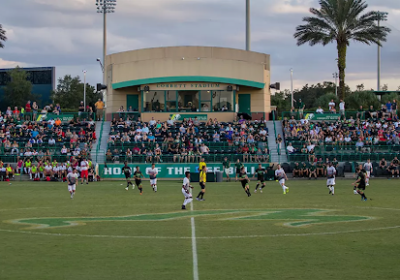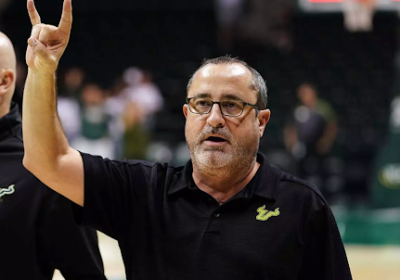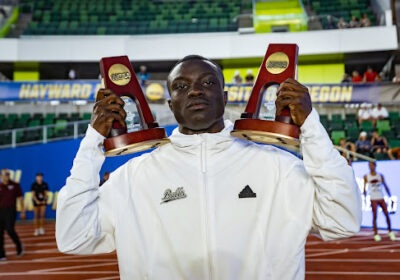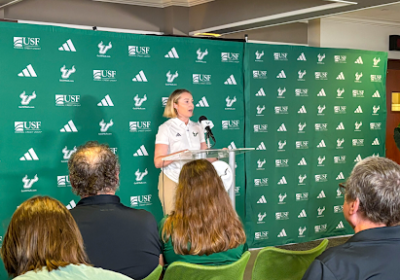Satellite camp debate missing the point

USF coach Willie Taggart has participated in satellite camps since his time as the head coach at Western Kentucky and will be soon hosting one with the University of Michigan. ORACLE FILE PHOTO/ADAM MATHIEU
The NCAA’s most recent debate over legislation regarding satellite camps has been a typical display of how the interests of students can fall to the wayside when it comes to making the rules.
While the NCAA Board of Directors voted to overturn the short-lived ban on satellite camps on April 28, the initial banning and outcries against them by several coaches across the country show what really matters in the grand scheme of college athletics.
The argument against satellite camps by the ACC and the SEC is that these camps interfere with the recruiting process and put more emphasis on summer camps than academics.
These two conferences simply want to play by their own rules, and the well-being of potential student athletes isn’t the concern of these coaches and commissioners.
“We continue to believe football recruiting is primarily an activity best focused in high schools during the established recruiting calendar,” SEC commissioner Greg Sankey said in a statement.
“(This) has provided opportunities for football prospective student-athletes from all across the country to obtain broad national access and exposure but with appropriate guidance from high school coaches, teachers and advisors that focuses on both their academic and athletic opportunities as they decide where they will play college football.”
Despite the fact that these schools have no trouble recruiting the best players in the country year in and year out, they still oppose camps that help players get more exposure and opportunities.
“When they banned the camps, I thought it was really bad — especially in Florida — because Florida has some of the best talent in the world when it comes to football,” USF sophomore defensive back Ronnie Hoggins said.
“For them to ban it in Florida is bad because a lot of these kids don’t have the opportunity to play in front of some of these coaches.”
For many aspiring college athletes, satellite camps provide an affordable and local opportunity to get an offer that might not have come otherwise.
“You’ve got kids on the verge of a university taking them or not,” USF defensive coordinator Raymond Woodie said. “Well you’ve got Joe Blow, a D-I prospect who shows up at a satellite camp and you’re wondering if he’s playing at a high level of competition.
“Well when he goes against those big-time Division-I guys and shows up — guess what: that benefits the kid on the borderline who maybe wasn’t going to get that offer.”
Hoggins’ first satellite camp was put on by USF in his hometown, Fort Lauderdale. He said meeting the coaching staff and the ability to showcase his skills near home made it easy for him to commit to the Bulls.
If the NCAA revisits the decision to rid itself of satellite camps, Hoggins said the impact will most be felt by the players who have limited resources.
“I would think it would have a negative impact (if satellite camps were banned) because not every athlete has that person in their lives that can take them to visit all these universities,” Hoggins said. “So, it would have a negative impact, especially where I’m from.”
Aside from the obvious benefits players receive from having the option to attend these camps, they also help non-Power 5 schools to remain competitive in a world where most recruits already flock to ACC and SEC schools.
Woodie, who also heads recruiting efforts for the Bulls, easily rattled off a list of the players he and the rest of the staff discovered at satellite camps.
“Ryeshene Bronson, Deadrin Senat, D’Ernest Johnson, Marlon Mack, Malik Dixon, and I can’t even mention some other guys,” Woodie said.
The NCAA Board of Directors made the right decision when they decided to allow satellite camps to continue, but with some of the most influential coaches in college football still up in arms over these camps, it could only be a matter of time before this rule is tweaked once again.
Even with the ACC and SEC lifting their self-imposed bans on these camps to maintain “competitive balance” in response to the recent rule reversal, coaches like Clemson’s Dabo Swinney are continuing their stand against the camps.
“It’s a loophole people are taking advantage of and I think it’s something that needs to be addressed,” Swinney said in an interview with ESPN. “I don’t think it’s a good thing because ultimately what happens is, instead of having camps, you’re having combines. I think there’s enough of that.”
Coaches have every right to recruit how they choose, but it doesn’t seem right that young kids should have a tougher time getting an offer from their dream school just because some people oppose the idea.
When it comes to satellite camps, the NCAA needs to remember it’s about the kids and ensure these opportunities stay open.








